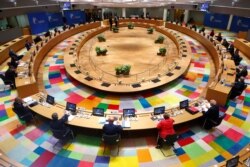In Brussels, European Union leaders are holding their first face-to-face summit in months on two key issues that will shape the bloc in the years ahead— a massive coronavirus economic recovery plan and its next multi-year budget. But differences, especially over the fund, remain sharp. Many are downplaying chances of striking a deal this time around.
Face masks firmly on, the 27 European heads of state started early on talks scheduled to end Saturday. But in a sign of the difficult negotiations ahead — and in hopes of a deal this weekend — Luxembourg’s Prime Minister Xavier Bettel said he had brought extra clothing should the meetings be extended by another day.
German Chancellor Angela Merkel, whose country currently holds the European Union’s rotating presidency, acknowledged differences remained very wide. Merkel says she is not certain an agreement will be reached at this summit.
Germany and France, the EU’s most powerful members, have teamed up to support a proposed $857 billion fund of grants and loans to reboot coronavirus-hit economies--especially those of southern European countries like Italy and Spain.
But four northern countries are reluctant to offer non-repayable grants—and want strict governance criteria. Here’s Prime Minister Mark Rutte of the Netherlands—considered to toe the hardest line among the so-called “Frugal Four,” meaning his country, along with Austria, Sweden and Denmark.
“If the South is needing help from other countries to cope with the crisis — I understand that because there is limited scope to deal with that financially themselves — then I think it is only reasonable for us to ask for a clear commitment to reforms. And if then, loans have to be converted to a certain extent to grants, then reforms are even more crucial — and the absolutely guarantee that they have taken place.”Italy’s economy minister, Giovanni Tria, told an Italian newspaper his country would fight any changes to the current recovery fund proposal. Still, many leaders and experts have voiced optimism a compromise will be reached — possibly later this month.
Also up for discussion is the EU’s next seven-year budget.
French President Emmanuel Macron called for more solidarity and ambition among leaders to tackle the post-coronavirus recovery. He said the coming hours would be decisive — adding he was optimistic, but prudent of a positive outcome.
For Germany’s Merkel, currently the bloc’s longest-serving leader and staunchly pro-EU one, a successful outcome may be particularly important. Merkel steps down next year, and analysts say she has an eye on her legacy. She also turned 66 on Friday, and Luxembourg’s Bettel said a deal on the recovery fund would be a great birthday present.





